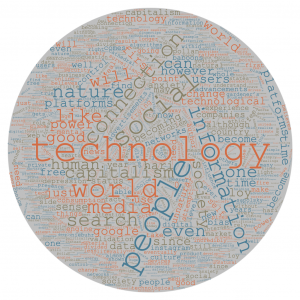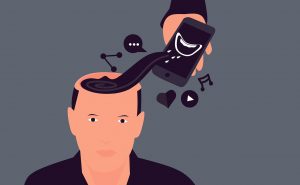45 Technological Takeover or Technological Makeover?
Alana Bowser

Hello! I’m Alana! I believe our health and the environment are deeply intertwined and are in danger with the rising climate crisis. In fact, everything in our world plays a part in the bigger scheme of things. Technology, I believe, is a force that alters, for better or worse, our connection to each other and nature. My chapter explores some of the big questions surrounding evolving technology in our world today…read more.

Is it just me or does it feel like the whole world is going crazy? From a global pandemic, to a civil rights revolt, to talk about election fraud, it seems like everything is spiraling out of control and technology seems to be adding fuel to the fire. It feels as if technology is the invisible hand that controls us all on every level, individually and as a culture. As technological advancements push further, the concern for the problems perpetuated by them rises as well. I am not trying to be labeled as a “Karen” of my generation, but technology is slowly eating away at our brains and degrading the fabrics that hold our society together.
The Social Dilemma is a documentary that highlights how technology has changed and reshaped our world. A major takeaway from the film is that technology is dividing our country, and even the world. The influence the internet has on our culture and society is almost beyond our comprehension. As a whole, we are becoming too comfortable and too reliant on these machines and networks. While comfort and stability are not necessarily a terrible thing, the flip side of the coin is that we are less aware and less likely to question the status quo. Without questioning, people slowly begin to lose the power behind their voice and democracy starts to crumble (Orlowski, 2020). As a consequence of our contentment, the system is using our psychology against us to profit off of our attention.
Since these mega tech companies monetize off of our attention, the information they feed us is biased. Google and all of the social networking apps use our activity to profile us off of our data to learn more about what we like and what we do not like, so they can specifically target marketing to us. It may seem harmless at first, like who cares if they use our data to market to us? But this is where many miss or ignore the warning. There is always more to the story than what is shown on screen, ironically.
The United States all of a sudden feels like we are on the brink of a civil war. While things were not all sparkly before 2020 hit us, the fire this year is raging more out of control than ever before. I mean literally, the west coast fires this year were some of the worst yet! Each year the traumatic events and culture wars get continuously worse. So, what is adding fuel to the fire? If we take a step back and observe the factors that are in play, the only factor growing exponentially each year is technology and its role in the lives of millions of Americans. Although technology is not the root of the problem, a lot of the issues would not be as detrimental as they are with it.
A deeper dive into why our country is so polarized, and we find that search engine bias is feeding this monster. Google, the world leader in the search engine market share, creates a so-called personalized search in order to enhance the users’ experience (Chaffey, 2020). Since these search engines are able to deliver more predictive results, it sounds like we are living in a utopia. However, nothing as simple and perfect comes without a cost. Gabriel Weinberg, who is the Founder and CEO of DuckDuckGo –– a private search engine –– stated:
Google is manipulating search and news results to bias them towards what it thinks it knows about people, based on the troves of personal data it has on them. This filtering and censoring of search and news results are putting users in a bubble of information that mirrors and exacerbates ideological divides (Cao, 2018).
No wonder why we are at each other’s necks. The people on each side of the divide are deeply convinced they are right since the only information they have ever seen or have been exposed to has been in their favor. As a species we desire information that conforms and confirms our beliefs and values; this is known as confirmation bias (Heshmat 2015). By taking note of this craving, technology is ultimately hacking our psychology.

Search engine bias gets especially alarming knowing that there is fake and false information circulating. Although the algorithms which run Google are intelligent, they cannot discern what information is true and what is not. According to a study done by the Massachusetts Institute of Technology, “Fake news travels to Twitter users six times faster than real news” and “diffused significantly farther, faster, deeper, and more broadly than the truth in all categories of information” (Wion Web Team, 2020). Technology brought the age-old philosophical question –– what is truth? –– to a whole new light. The internet has the capacity to do good, but it is also able to create and foster violence and spread misinformation, whether that be in the digital or the physical world.
The influence the internet has on our world does not just stop at the cultural and societal level, it obviously seeps into the individual level as well. Higher use of social media has been correlated with mental illness, specifically depression and anxiety (Hoge et al., 2017). Although most of the studies have been observational, the data is still noteworthy. We have all heard of how addicting technology can be, and I can guarantee many of us are watching people among us get sucked into the mind-warping blackhole each and every day. Unfortunately, for most tweens and teens whose brains are still developing, they have no chance against the technological beast. Social influence is real and is becoming a huge problem as the business grows without regulation.
As the years progress and people are born into this new digital age, we as a collective are becoming too naive to the power that controls our screens and networks. Edward O. Wilson, a professor at Harvard and sociobiology expert, concluded, “The real problem of humanity is the following: We have Paleolithic emotions, medieval institutions, and godlike technology” (Harris, 2019). We simply cannot handle the capacity in which information is made available to us. All of the news in the world, as crazy as it sounds, is at our fingertips within seconds. We are infinitely bombarded and overloaded with information. Our primitive brain structures are no match to this ever-so evolving technology.
As our society is becoming evermore divided it makes sense why we as individuals turn to our devices. Johann Hari, the author of the book Lost Connections: Why You’re Depressed and How to Find Hope, attempts to explain our urge to turn toward digital platforms rather than real-life interactions. Hari begins by addressing that our society is incredibly anxious because we are lonely and are searching for connection. He also points out that “loneliness is an ‘aversive state that motivates us to connect’” (Hari, 2018). As the most popular social media platforms such as Facebook, Twitter, Instagram, Snapchat, Pinterest, Reddit, etc. started to emerge, the connection we craved conveniently became only a few clicks away. At first, these platforms were a force for good, and although they did prove valuable in some areas, the negatives soon began to outweigh the positives. People started to compare their lives to others in their social bubble. What’s the harm in a bit of comparison, right? Well as to no surprise, nobody wants to talk about or shine a light on the gray areas in their life, so people curate the content they post to exemplify only the good. After a while, these networks become jammed with unrealistic insights into people’s lives. When going on said platforms it is easy to forget everything is carefully chosen by the creators, so comparison becomes almost inevitable. This is where it gets troublesome, but then comes the like button. Now people, with a focus on preteens and teens, correlate self-worth with social validation. This validation is dependent on how prosperous one’s content is, such as the number of likes and comments one gets on an Instagram post.
Social validation links to a greater hierarchy of status and respect. Hari continues his conversation and interviews Robert Sapolsky who studied baboons, our cousins in evolutionary terms, for years in the savannas of Africa. Sapolsky studied a single pact of baboons, one pact consisting of fifty to a hundred and fifty baboons, in an attempt to understand anxiety and depression among social groups. He observed that the baboons were only distressed when their status was threatened or of low standing. In the end, Sapolsky concluded that “depression and anxiety are a response to the constant status anxiety many of us live with today” (Hari, 2018). Trying to prove a high status on social media platforms consistently is why these networks are so detrimental to the mental health of their users.

Dopamine pathways drive our craving for acceptance. When a person receives a notification, dopamine rushes through the reward pathways in their brain. After prolonged use, the associations between the stimuli and the behavior becomes stronger, resulting in addiction (Haynes, 2018). If we take a retrospective point of view, we find that we first ventured into the digital world seeking connection. Connection is addicting, but the connection we are now getting high off of is a shallow superficial connection. Hari states, “Our obsessive use of social media is an attempt to fill a hole, a great hollowing, that took place before anyone had a smartphone” (2018). Until we wake up and realize technology does not feed the hunger in our soul, we will be incapable of experiencing true meaningful connection.
Reinhold Niebuhr and David R. Loy, who have Christian and Buddhist beliefs respectively, attempt to explain the void Hari discussed. This void has plagued our society even before the first computer was ever created. Niebuhr argues our innate anxiety is to be credited to the fact that we as a species are in a paradoxical contradiction –– we are both finite and free. Loy, holding a similar argument, believes we are anxious and insecure because we struggle to find meaning since we lack the “security that comes from knowing our place and role in the cosmos” (2010). All thanks to the good ole Greeks for distinguishing nomos from phusis,[1] we are trying to define who we are and what it means to be human. This security which we have been seeking for so long eventually manifested itself into technological advancements that seemingly control our society at large.
Our society in the United States is driven by capitalism, and capitalism drives consumerism so advertisements are to be expected. However, the capitalism we are seeing in society today is not the same capitalism we saw in the Golden Age after World War II. Shoshana Zuboff, a professor at the Harvard Business School and author of The Age of Surveillance Capitalism, calls this newly evolved version of capitalism surveillance capitalism and affirms that, “Surveillance Capitalism claims private human experience for the market dynamic, and it repurposes private human experience as a free source of raw material for production and sales” (Azhar, 2019). Advertisements shape the business model of these huge tech companies. Essentially, we as consumers do not pay for Gmail, Instagram, or Facebook. Since there is no product being sold, how are these companies profiting? Jaron Lanier, the author of Ten Arguments For Deleting Your Social Media Accounts Right Now, describes the product as “the gradual, slight, imperceptible, change in your own behavior and perception” (Orlowski, 2020). Ads are precisely selected to target users to evoke feelings of shame and discontent. Such feelings may stick and even linger. The users will most likely develop a low self esteem, which may eventually lead to depression. Unlike traditional print ads or billboards, online advertisements are more persuasive since these companies and networks have data profiles on their users.
Advertisements warp our minds to believe we are not good enough and we will not be until we have that one bag, shirt, car, house, vacation, etc. Funny though, that one thing turns into another, and then another, and so forth. Unconsciously, we are being sucked into a consumerist loop of supposed need. However, we do not need forty-seven sweaters, six cars, a mansion with an infinity pool, or even more Instagram followers. We need real human connection –– a connection that will never be found with artificial intelligence or from buying trending material goods.

Loy, as mentioned earlier, believes our overwhelming sense of self separates us from other people and the natural world, individually and collectively. He describes the self as being a mental construct that is always insecure. The way we seek to secure ourselves is “by identifying with things ‘outside’ us that (we think) can provide the grounding we crave: money, material possessions, reputation, power, physical attractiveness, and so forth” (Loy, 2010). This is what Buddhism believes causes dukkha — suffering. The three poisons: greed, ill will, and delusion are externalities of a life consumed by dukkha.
Despite all of its downfalls, capitalism is not dumb. In fact, good ole Adam Smith was onto something, even if he himself did not intend or realize it. Capitalism took note of our innate anxiety that Niebuhr and Loy proposed, and harnessed it. On all levels, whether you are Jeff Bezos or a random Bill, it satisfies our hunger for security. Apparently, consumption is the new salvation.
In an attempt to relieve our desire for meaning, we have created dozens of problems, and one which even threatens our very own existence –– climate change. Loy claims, “Increasing dependence on sophisticated, ever more powerful technologies tends to aggravate our sense of separation from the natural world, whereas any successful solution must involve recognizing that we are an integral part of the natural world” (2010). Instead of exploring the wonders of the world, most people are cooped up in their homes or in their office on their devices. Technology is creating a barrier between people and the natural world. As our societies become more advanced, concern for the environment decreases. In fact, the materials and energy required to produce these devices in the first place is not sustainable whatsoever. Aside from the creation footprint, the data centers which store all of the world’s online information take up a ton of room and rely on an enormous amount of energy, which is mainly sourced from fossil fuels (Tarnoff, 2019). To make matters even worse, climate change is controversial because of the political division in our country. The divide, as mentioned previously, is partly caused by the bias of search engines and the media.
Technology has evolved to have a mind of its own, literally. Algorithms are becoming too difficult to understand and control by their very own creators. The presence of these machines has become deeply ingrained in the culture of our society –– almost everyone has a cellphone, a computer, or a television. Technology is in every corner. It is almost as if technology is developing a Godlike presence.
Are our advancements becoming unnatural since we are creating a nature that is somewhat deterministic? Michael Pollan, author of Second Nature: A Gardener’s Education, claims “human choice is unnatural only if nature is deterministic; human change is unnatural only if she is changeless in our absence” (1991). Our power over nature increases as the years progress. We are reaching the point where we can make artificial organs and even create babies in a petri dish. Though these scientific advancements are life altering for people in a good way, where and when do we draw the line? If we continue technological advancement and dominance at the current rate, it would essentially be impossible to live at the grace of “God’s will” or whatever higher power you believe in. Nothing could be up to the fate of God or the universe if we have control over even the most finite things. Human choice and change may soon be unnatural. The essence of our humanness could eventually fade. When we lose our humanness we will be left trying more than ever to define the purpose and meaning of life itself when we have utmost control.

The question now is, how do we approach technological advancements so technology does not develop a Godlike presence and so human choice and change does not become unnatural? In a politically divided country, it is obvious that a zero-sum game does not work because it just deepens the divide. Micheal Pollan defines said zero-sum game as the wilderness ethic. He recalls the story of Cathedral Pines, a local forest that was knocked down in a storm. The naturalists wanted to leave the forest alone while the common men figured that they might as well clear the forest, utilize the fallen timber, and build condos. Each proposal was problematic and extreme. However, in an epiphany, Pollan discovered the answer does not lie at one of the extremities, but rather in between them. Here, he proposed a gardener’s ethic as a way to peacefully coexist with nature –– a sort of balance between intellectus and ratio thinking.[2] A gardener’s ethic requires one to read the genius of the land to understand how to approach situations like Cathedral Pines with a mindset that is fair and equal to both man and nature.
An all or nothing mindset favors either nature or the market; in regards to technological advancement, nature would be the common good of man. The goal should be to achieve a harmonious coexistence, rather than to do away with technology completely or live blissfully unaware. Just as Pollan discovered reading the genius of the land was the most appropriate form of action at Cathedral Pines, we must step back and try to make sense of where and how the path took a left turn.
Technology is not a curse, but it should not be our holy grail either. And while I have shown you the dark side of its capacities, technology has still proven to do tremendous good. Long lost friends and or family members are able to reconnect, people have found organ donors, fundraising for causes is no longer as unrealistic and difficult, students have access to an unlimited amount of information, I mean the list goes on and on. My main point is that there is light at the end of the dark tunnel. We have been abusing this privilege blindly and we no longer see technology as an incredible tool for limitless opportunities.
As ironic as it is, one of the best ways to advocate for reform is to speak out on these very platforms. We as consumers need to be conscious of the information we take in and where we retrieve that information from. Fact checking and hearing both sides of the argument is absolutely essential to formulate an unbiased opinion in a politically divided country. It is unfortunate that the burden lies on the shoulders of us consumers, but until the government places stricter regulations on these companies, it is the best option we have. Instead of voting with your dollar, you vote with your time.
We all know those people who decide to go out on a limb and renounce smoking or become a newly declared vegan. I know those people pretty well considering those people in the example are my mother and me, respectively. While unfortunate, neither of us succeeded in our pursuits by going flat out cold turkey. Every New Year my mother would find herself in the same spot with the same goal. To this day, she still has not been able to quit smoking. For me, I went vegetarian first, and then vegan, and now I am plant based and have been for years. There may be some whose goals persist beyond a week, but more often than not going all in at once is not sustainable over time. If we truly want to see a difference in people and the tech industry at large, we must limit our screen time. In my personal experience, it has been most effective for the restrictions to start off small and increase over time; more attention to effective strategies for different people could help us all.
Our moral impairment, which Niebhur and Loy discuss, drives up screen time. By placing these time restrictions on usage we are forcing ourselves to look within and deconstruct and reconstruct our sense of self. Once we break free of the weight that has been holding the Good[3] down, the changes that will follow can have a positive rippling effect. We might no longer fall victim to the false connection social media promises. Our hearts will crave something deeper and more genuine.
As time goes on and consciousness of media consumption deepens, there are other ways to vote with your “dollar.” To start, be mindful of surfing the web. Remember each Google search has a carbon footprint. Search for what you need, because it comes with a cost even though it is free. Secondly, choose a safe web browser that puts consumer privacy first. The algorithms that run Google are out of this world, literally, and are incredibly biased. To become a conscious consumer you have to remember that these are all tools not means, to aid us in our becoming. And lastly, with the world at our fingertips it is so incredibly easy to let things get to your head. Mental health is an epidemic and has been shown to positively correlate with the rise of advanced technology and social media. Teens these days rely so much on others for validation. It might just be me who sees and thinks this, but everyone is trying so hard to be like someone else. There is no originality or individuality in the rising generations. Although I was born in 2001, I feel so disconnected from all of my peers. The type of connection social media provides I think is the reason why.
By looking within and searching for true connection –– not just superficial connection, our power over nature will decrease as well. We are at such a critical point in history. The fate of the very earth that we call home is crumbling because the hearts of the people, especially authority figures, are filled with cravings for profits and power. To clarify, our nature in itself requires a basic level of consumption necessary for survival, such as for food, shelter, clothing, etc. However, we have shifted into an era of overconsumption that is unnecessary and destructive. As described before, consumption nowadays poses as the new salvation. The hearts of those in “power” rely on advertising to our insecurities in order to profit. They appeal to our sense of identity and self worth to make us feel like we have to buy their product or service to feel whole. Social media and online platforms are assisting these people of “power” by extending their reach.
The world issues are all interconnected. No problem has a simple answer. Solving one does not simply mean we can solve the others. However, human nature and our insecurities play a role. Finding a more secure and genuine basis for our identities can help us see through the shallow and harmful aspects of social media and other technologies. If we can free ourselves from the paradoxical contradiction that we are both finite yet free, we will be less likely to remain stuck. The social dilemmas we face today as a result of the growing influence of technology are still just a reflection of the dilemmas we face more fundamentally as humans.
References
Azeem, A. (2019, June 19). Surveillance Capitalism. [Season 3, Episode 12]. In Exponential View. HBR. Retrieved from https://hbr.org/podcast/2019/06/surveillance-capitalism
Baer, R. (1976). Our Need to Control: Implications for Environmental Education. The American Biology Teacher, 38(8), 473-490. doi:10.2307/4445695
Cao, S. (2018, December 13). Does Google Manipulate Your Search Results? Sundar Pichai’s Rival Says Yes, Explains How. Observer. Retrieved December 12, 2020, from https://observer.com/2018/12/google-search-algorithm-bias-duckduckgo-ceo/
Hari, J. (2019). Chapter 7 and 10. In Lost Connections: Why You’re Depressed and How To Find Hope. New York, NY: Bloomsbury Publishing.
Harris, T. (2019, December 05). Our Brains Are No Match for Our Technology. The New York Times. Retrieved December 12, 2020, from https://www.nytimes.com/2019/12/05/opinion/digital-technology-brain.html
Haynes, T. (2018, May 1). Dopamine, Smartphones & You: A battle for your time. Harvard University. Retrieved December 12, 2020, from http://sitn.hms.harvard.edu/flash/2018/dopamine-smartphones-battle-time/
Hauerwas, Stanley. (1974). The Significance of Vision: Toward an Aesthetic Ethic. In Vision and Virtue. Notre Dame, IN: University of Notre Dame Press.
Heshmat, S. (2015, April 23). What Is Confirmation Bias? Psychology Today. Retrieved December 12, 2020, from https://www.psychologytoday.com/us/blog/science-choice/201504/what-is-confirmation-bias
Hoge, E., Bickham, D., & Cantor, J. (2017). Digital media, anxiety, and depression in children. Pediatrics, 140(Supplement 2), S76-S80.
Loy, D. R. (2010). Healing Ecology. Volume 17 Journal of Buddhist Ethics (pp. 253-267). Retrieved from http://www.buddhistethics.org/
Niebuhr, R. R. (1995). Chapter VII Man as Sinner. In The Nature and Destiny of Man (Vol. 1, Human Nature, pp. 178-207). New York, NY: Charles Scribner’s Sons.
Orlowski, J. (2020). The Social Dilemma. [Documentary]. Netflix. Retrieved from https://www.netflix.com/watch/81254224?trackId=14170287&tctx=2%2C1%2C349e27f4-4b70-4aca-ac4b-8034a85d0946-11400368%2C03ab2951-3ff9-4d3e-80e0-6c957333684b_9497283X3XX1607737225894%2C03ab2951-3ff9-4d3e-80e0-6c957333684b_ROOT%2C
Pollan, M. (1991). Chapter 10. In Second Nature: A Gardener’s Education. New York, NY: Grove Press.
Tarnoff, B. (2019, September 18). To decarbonize we must decomputerize: Why we need a Luddite revolution. The Guardian. Retrieved December 12, 2020, from https://www.theguardian.com/technology/2019/sep/17/tech-climate-change-luddites-data
Wion Web Team. (2020, September 16). Fake news travels six times faster on Twitter than real news: MIT study. MSN. Retrieved December 12, 2020, from https://www.msn.com/en-in/news/world/fake-news-travels-six-times-faster-on-twitter-than-real-news-mit-study/ar-BB196qci
Wright, G., & Chaffey, D. (2020, September 03). Search engine marketing statistics 2020. Smart Insights. Retrieved December 12, 2020, from https://www.smartinsights.com/search-engine-marketing/search-engine-statistics/
- Nomos, as described by Loy, means “the conventions of human society (including culture, technology, and so forth)”...whereas phusis means “the natural patterns of the physical world” (2010). Notably, most indigenous ways of thinking do not separate humans from nature in this way. ↵
- Ratio is “the power of discursive, logical thought, of searching and examination, of abstraction, of definition and drawing conclusions” (Baer, 1976). Intellectus is “the power of direct intuition associated with the passive receptivity of the contemplative” (Baer, 1976). The knowledge linked with ratio thinking is straight cold hard facts, whereas intellectus thinking correlates with an artistic mindset. The reference here is pointing to an idea where instead of being entirely subjective or objective, we can look to an approach that draws on the strengths of both to construct a well-balanced plan. A plan skewed either to be more or less objective or subjective leads to an imbalance, which may ultimately compromise the end goal. ↵
- Iris Murdoch, with views close to Buddhist principles, concludes that we are not as free as we believe to be and that our understanding of ourselves is too grand. She believes we are stuck in our fantasies and illusions because our minds are clouded with self-preoccupation. In order to obtain true freedom, we must recognize life as the gift it is and understand that we are not the center of all things. Once the fog dissipates, new perspectives on moral issues arise. Murdoch states, “It is only as our vision is centered on the Good that our subjectivity can be overcome and the objectivity of the other in its particularity affirmed” (Hauerwas, 1974). To be able to see clearly, we must find a balance, just as Baer said, between intellectus and ratio thinking. If we love, it must not be an assertion of one’s self, but rather as an appreciation of the other. ↵
